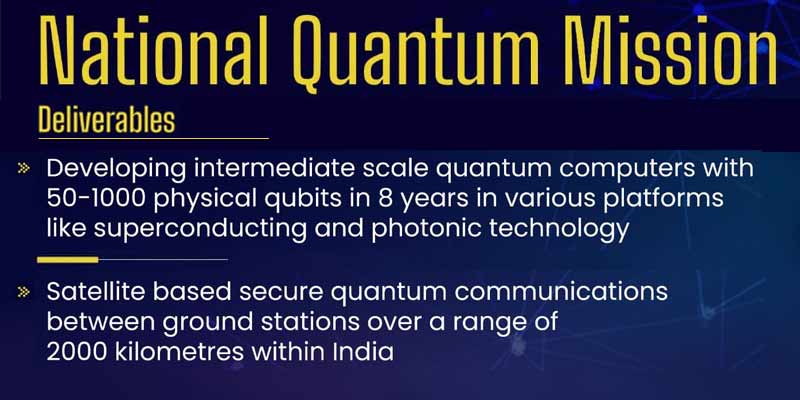- India
- Apr 19
Cabinet approves National Quantum Mission
The Union Cabinet approved the National Quantum Mission to nurture and scale up scientific and industrial research and development in quantum technology.
The mission involves a cost of Rs 6,003.65 crore from 2023-24 to 2030-31.
The National Quantum Mission (NQM) will accelerate quantum technology-led economic growth and nurture the ecosystem in the country.
What is quantum technology?
• Quantum technology is based on the principles of quantum mechanics developed in the early 20th century to describe nature at the scale of atoms and elementary particles. Using quantum superposition, a set of unbreakable codes or super-speedy information processing, quantum computers are able to mimic several classical computers working in parallel.
• Quantum technology is manifested through applications in secure communication, disaster management through better prediction, computing, simulation, chemistry, health care, cryptography, imaging among others.
• Scientists have expanded quantum theory to understand biological phenomena such as smell, consciousness, enzyme catalysis, photosynthesis, avian navigation like that of the Robin, origin of life and effects on coronavirus.
• Some stalwarts in this field include Satyendra Nath Bose, Sir Chandrasekhara Venkata Raman and Meghnad Saha. India is currently at the forefront of tapping the second quantum revolution through massive investments in the field.
• The range of quantum technologies is expected to be one of the major technology disruptions that will change the entire paradigm of computation, communication and encryption.
• It is perceived that the countries who achieve an edge in this emerging field will have a greater advantage in garnering multifold economic growth and dominant leadership role.
• Quantum computing is an emerging field that harnesses the laws of quantum mechanics to build powerful tools to process information. It has the potential to solve computational problems that are beyond the reach of classical computers, and lead to new breakthroughs that can transform chemical engineering, material science, drug discovery, financial portfolio optimisation, machine learning and much more.
• Quantum computers consist of quantum bits, or “qubits”.
Objectives of the mission:
• The mission would greatly benefit communication, health, financial and energy sectors as well as drug design, and space applications.
• The new mission targets developing intermediate scale quantum computers with 50-1,000 physical qubits in eight years in various platforms like superconducting and photonic technology.
• Satellite-based secure quantum communications between ground stations over a range of 2,000 km within India, long distance secure quantum communications with other countries, inter-city quantum key distribution over 2,000 km as well as multi-node quantum network with quantum memories are also some of the deliverables of the mission.
• The mission will help develop magnetometers with high sensitivity in atomic systems and atomic clocks for precision timing, communications and navigation.
• It will also support design and synthesis of quantum materials such as superconductors, novel semiconductor structures and topological materials for fabrication of quantum devices.
Four thematic hubs (T-Hubs) will be set up in top academic and national research and development institutes on the domains:
i) Quantum computing
ii) Quantum communication
iii) Quantum sensing and metrology
iv) Quantum materials and devices.
• The hubs which will focus on generation of new knowledge through basic and applied research as well as promote R&D in areas that are mandated to them.
Manorama Yearbook app is now available on Google Play Store and iOS App Store

